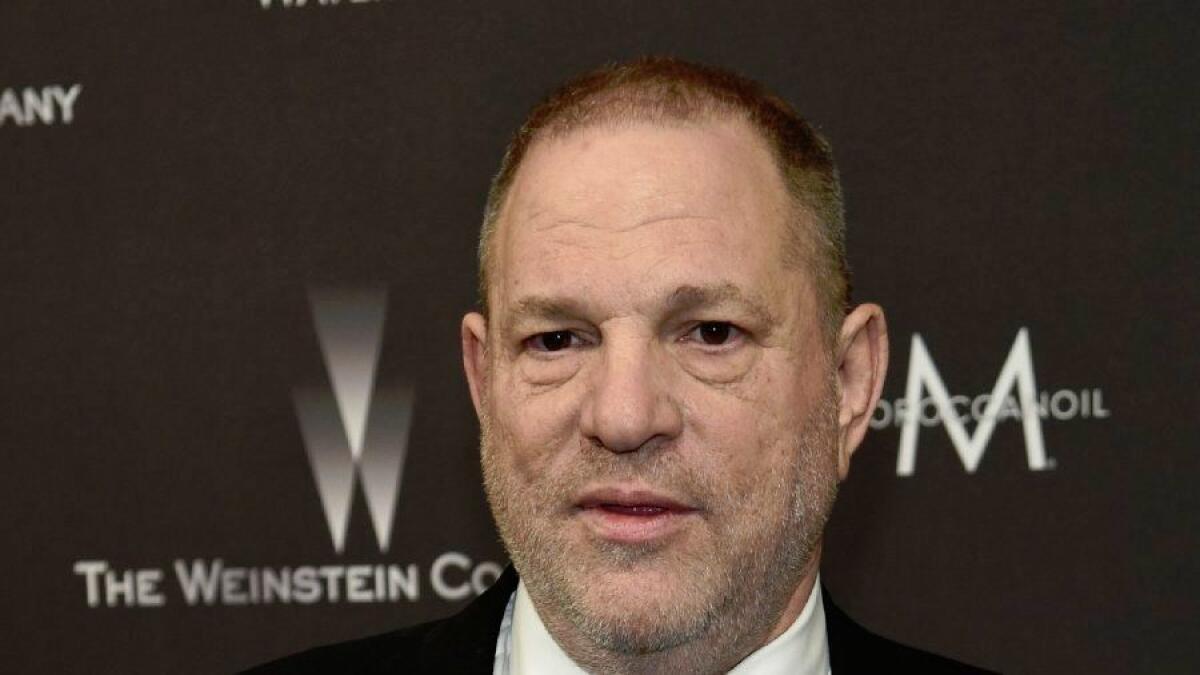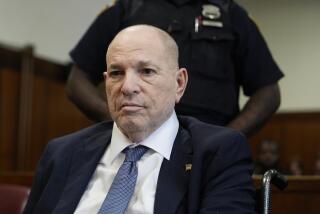New York attorney general sues Weinstein Co. for civil rights ‘violations,’ throwing sale into question

- Share via
A $500-million deal to sell Harvey Weinstein’s troubled old studio to former Obama administration official Maria Contreras-Sweet hit a major roadblock this weekend after the New York attorney general’s office expressed serious concerns about the sale.
New York Atty. Gen. Eric Schneiderman on Sunday sued the Weinstein Co. and its co-founders, Harvey Weinstein and Bob Weinstein, for “egregious violations of New York’s civil rights, human rights and business laws,” the attorney general’s office said in a statement.
“The Weinstein Co. repeatedly broke New York law by failing to protect its employees from pervasive sexual harassment, intimidation and discrimination,” Schneiderman said in a statement. “Any sale of The Weinstein Co. must ensure that victims will be compensated, employees will be protected going forward, and that neither perpetrators nor enablers will be unjustly enriched. Every New Yorker has a right to a workplace free of sexual harassment, intimidation and fear.”
The lawsuit, filed in New York County Supreme Court, jeopardizes the planned sale to Contreras-Sweet, which was backed by billionaire Ron Burkle’s Yucaipa Cos. The buyer has been in negotiations with the Weinstein Co. for weeks. The Contreras-Sweet deal would give her control over the studio’s assets. Her group has promised to set up a majority-female board and establish a fund to help women who have alleged abuse by Harvey Weinstein. Contreras-Sweet ran the U.S. Small Business Administration under President Obama from 2014 to 2017.
A deal was expected to be signed Sunday and announced this week, ending a protracted search for a buyer four months after sexual harassment and assault allegations against Weinstein sent the New York company into a tailspin. Authorities in Los Angeles, New York and London have launched criminal investigations into the allegations against Harvey Weinstein. He has denied claims that he engaged in nonconsensual sex with women.
The company is facing multiple other lawsuits, including a class-action case filed in November that accused the studio of enabling Weinstein’s alleged predatory behavior.
Schneiderman’s office launched its civil rights investigation into the Weinstein Co. in October, shortly after allegations of sexual misconduct were detailed in the New York Times and the New Yorker. Schneiderman issued a subpoena for company documents as part of an investigation into whether officials at the film and television company violated state civil rights and New York City human rights laws.
The New York Daily News on Saturday first reported that Schneiderman’s office was preparing to sue the Weinstein Co.
The 38-page complaint claims that the Weinstein Co. board of directors and executives failed to protect employees or curb Harvey Weinstein’s misconduct, despite widespread knowledge of his behavior and numerous complaints to the company’s human resources department. Groups of predominantly female employees, described in the complaint as members of Harvey Weinstein’s “roster” or his “wing women,” were made to facilitate Weinstein’s sexual conquests, the suit says.
“We are disappointed that the New York Attorney General felt it necessary to file today’s complaint,” the Weinstein Co. board of directors said in a statement. “Many of the allegations relating to the Board are inaccurate and the Board looks forward to bringing the facts to light as part of its ongoing commitment to resolve this difficult situation in the most appropriate way.”
Representatives for Yucaipa and Contreras-Sweet declined to comment.
Schneiderman’s office also expressed deep concerns about whether the new company that results from the planned sale will make good on its promise to compensate victims beyond what would normally be paid through insurance. It also raised worries about the future leadership of the studio.
The attorney general’s office said in its statement that it has “substantive basis” to believe the sale would “leave victims without adequate redress, including a lack of a sufficient victims compensation fund.”
The office “also believes that the proposed terms of the sale would allow the perpetrators or enablers of the misconduct to see a windfall, and allow top officials at TWC who share responsibility for the misconduct to serve in executive positions of the new entity,” according to the statement.
Schneiderman’s office has questioned the possible appointment of Weinstein Co. President and Chief Operating Officer David Glasser as chief executive because he served as Harvey Weinstein’s right-hand man for years and essentially ran the business, according to a person familiar with the matter.
A representative for Glasser declined to comment.
According to a document reviewed by The Times, the attorney general’s office has been seeking assurances that the company will establish a fund that will adequately compensate accusers. The office has also demanded that the company put into escrow any proceeds from the sale that would go to Harvey Weinstein or his brother, Bob, who co-founded the studio in 2005.
Schneiderman’s office has also demanded oversight over the company as part of the purchase agreement to ensure that the new company takes adequate steps to protect employees. Contreras-Sweet balked at the demand for government oversight, said two people familiar with the matter who were not authorized to comment.
“We expressed to them how important it is that any deal adequately compensate victims, protect employees, and not reward those who enabled or perpetuated this egregious sexual misconduct,” said Amy Spitalnick, press secretary for the office of the New York attorney general, in an emailed statement. “We were surprised to learn they were not serious about discussing any of those issues or even sharing the most basic information about how they planned to address them.”
If a deal is not reached, the Weinstein Co. may be forced into bankruptcy. The financial burden and mounting legal threats against the company led many industry veterans to say the studio would have to file for Chapter 11 bankruptcy protection or shut down. Weinstein Co. tried and failed to secure financial lifelines from investors such as Thomas Barrack’s Colony Capital and private equity firm Fortress.
Santa Monica-based studio Lionsgate, known for “La La Land” and “The Hunger Games,” was interested in buying certain assets of the company. Killer Content, the New York production company behind “Carol” and “Still Alice,” had offered to buy the assets and remake them into an entity to support women. Other bidders included Miramax (owned by BeIN Media) and private equity firms Shamrock Capital Advisors and Vine Alternative Investments.
Contreras-Sweet’s offer would not require a Chapter 11 bankruptcy process. Under the terms of the proposal, her group would assume $225 million in debt and establish a fund worth $50 million to $60 million for Weinstein’s accusers, according to people close to the deal.
UPDATES:
8:30 p.m.: This article was updated with a statement from the Weinstein Co. board of directors.
3:15 p.m.: This article was updated with additional information from the New York attorney general’s lawsuit.
1:44 p.m.: This article has been updated with a lawsuit filed by the New York attorney general against the Weinstein Co.
This article was originally published at 11:45 a.m.
More to Read
Inside the business of entertainment
The Wide Shot brings you news, analysis and insights on everything from streaming wars to production — and what it all means for the future.
You may occasionally receive promotional content from the Los Angeles Times.











